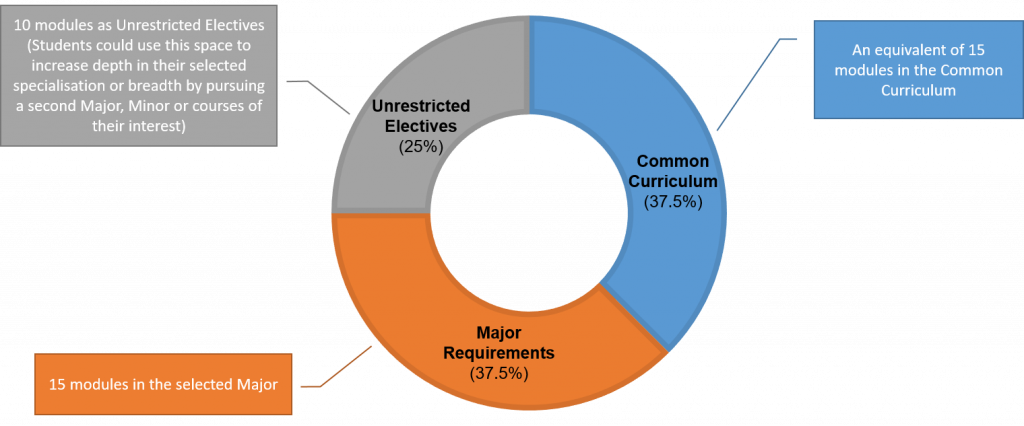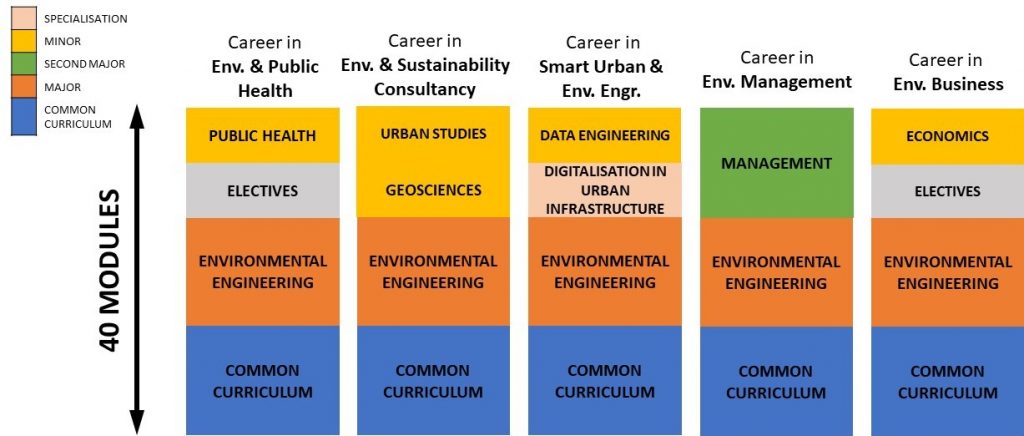Curriculum
Build Your Own Degree
Starting from Academic Year 2021/2022, students must read a total of 160 units (or the equivalent of 40 courses), comprising a Common Curriculum, Major Requirements and Unrestricted Electives.

- The common curriculum comprises 7 Pillars that integrate knowledge and skillsets relevant to the 21st century.
- The modules making up the Environmental and Sustainability Engineering Major Requirements are
available here. - Unrestricted Elective Courses (UEC) allow students to explore greater breadth or depth in any subject and at any level. Examples of combination are illustrated below
You can declare or apply for a second major or minor no later than the fifth semester of your study. Application for a specialisation usually takes place at the end of your fourth semester. Application for a specialisation usually takes place at the end of your fourth semester.
Specialisation
Second Majors
Examples of Second Majors that could be of interest to Environmental and Sustainability Engineering students
Sustainable Urban Development
The objectives of the Second Major are to provide students with broad exposure to the field of urban sustainability and to equip them with interdisciplinary knowledge and skills to be able to address the most pressing issues of urban development and its human impacts in cities in the context of changing climate from the sustainability viewpoint.
Click here for more information.
Public Health
The Second Major in Public Health welcomes students who are keen to learn the approaches and skills necessary to understand the individual and social factors that impact the health of individuals, families and communities.
Click here for more information.
Life Sciences
Life Sciences provides comprehensive training on the essential concepts and the latest research techniques critical to the diverse spectrum of disciplines within and beyond biological and biomedical fields. From molecular and cellular worlds to organismal individuals, and from macro-level ecological views to underlying evolutionary concepts, different aspects of life sciences contribute to our understanding of how humans work, and how we interact with, and impact our environment.
Click here for more information.
Economics
In Economics, students learn theories of how individuals and firms make optimal decisions. They learn how markets work, when markets fail, and the roles institutions can play to improve markets and societal well-being.
Click here for more information.
Minors
Examples of Minors that could be of interest to Environmental and Sustainability Engineering students (non-exhaustive list):
Minor in Data Engineering
The Minor in Data Engineering programme is a joint-initiative by the College of Design and Engineering and the School of Computing. The main aim of the Minor is to train graduates with the ability to handle and manage the large volume of data generated by industry and glean actionable insights from that data.
Click here for more information.
Minor in Entrepreneurship
The Minor in Entrepreneurship is designed for non-business students seeking to understand innovation processes and develop the managerial and leadership skills needed to launch a new venture.
Click here for more information.
Minor in Geographical Information Systems
The Minor is appropriate for students interested in careers utilizing Geographical Information Systems (GIS) as an analytical tool in such areas as geography, business, communication, engineering, environmental science, political science, public health, sociology, and urban planning, or for students pursuing GIS as a profession in a related discipline such as computer science or information systems. Students who complete the programme will leave it with a set of skills, and the ability to apply these to different areas of knowledge.
Click here for more information.
Minor in Environmental Sustainability
Environmental sustainability issues are multi-disciplinary, requiring a foundation in ecology for the management of natural resources and waste impacts on natural systems, along with skillsets and knowledge spanning other natural sciences, social sciences, engineering, finance, business, etc. for addressing sustainability issues.
Click here for more information.
Enhancement Programmes
Other options of using your UEM space include:
- Enhancement Courses: experiential learning opportunities for innovation and research within CDE
- Design Your Own Courses (DYOC): students may choose what they want to learn, how they wish to learn, and from whom they wish to learn, for up to 8 units
- Career Catalyst: foundational module to kickstart students’ preparation for internships and their future careers



